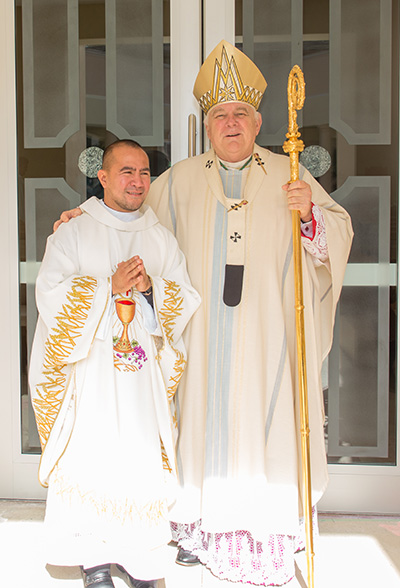By Archbishop Thomas Wenski - The Archdiocese of Miami
Archbishop Thomas Wenski preached this homily at Our Lady of the Holy Rosary-St. Richard Parish in Palmetto Bay the morning of Dec. 17, when he ordained Father Richard Giner for the Trinitarian Fathers.
On this day, a week before Christmas Eve, through the imposition of my hands, God gives this parish and the Trinitarian Fathers the early Christmas gift of a new “Father.” By the “laying on of hands” in this sacred rite of Holy Orders, Richard Giner is configured to Christ the eternal High Priest and, joined to the priesthood of the bishops, he is consecrated as a true priest of the New Testament to preach the Gospel, to shepherd God’s people, and to celebrate the sacred liturgy, especially the Lord’s Sacrifice. I am confident that, with the continued help of God’s grace, Richard will be a good leader and a good shepherd of God’s people.
A priestly vocation, in the words of the Pope St. John Paul II, is both a “gift and a mystery.” To embrace the gift and to enter into the mystery which enables the priest, in communion with Jesus to act in his name and in his sight, as a shepherd of souls, is a step not to be taken lightly. Since the priest offers the Holy Sacrifice every day, sacrifice must also be the condition of his life. In giving Christ’s Body and Blood, we must also give our body and blood for the life of our people.
Today, Richard feels keenly what sacrifices responding to one’s vocation can entail � for he becomes a priest � like many of the men you see here � to serve in a country far from the land of his birth. His sacrifice means being far away from parents, brothers and sisters. There are many who because of that distance and because of the difficulties in securing visas for travel to the United States cannot be here in person to share with us our joy in Richard’s ordination. And on behalf of the Trinitarians, allow me to thank your parents and your siblings for the gift of their son and brother � it was in that family that his faith developed and grew, in that family that his vocation was nourished and encouraged.

Photographer: ROBERTO AGUIRRE | FC
Archbishop Thomas Wenski poses for photos with newly-ordained Trinitarian Father Richard Giner in front of the recently remodeled chapel of Holy Rosary-St. Richard Church.
And we thank God for Richard’s “yes” given to God so generously and uncompromisingly today in the midst of this beautiful parish community. Just as we pray for him today, we must continue to pray for him and all our priests. This is the best way we can support them and all our priests in the daily living out of that “yes” as they share in the very mission of Christ � sowing the seed of his Word, dispensing his Divine Mercy in the Sacrament of Penance, and nourishing the faithful at the table of His Body and Blood.
Through his pastoral ministry and his daily celebration of the Eucharist, Richard is to help the people entrusted to his care to come to the fullness of life in Christ; by healing hearts broken by sin and despair, he will help make God’s people “witnesses to hope.” Our world, increasingly organized as if God does not matter, desperately needs that witness. The world desperately needs the priest’s witness that God in fact does matter. This witness is made more compelling by his detachment from material comforts and signs of status, by his readiness to obediently be available wherever his superiors may send him, and by his chaste celibacy which is the source of spiritual fecundity. The celibacy which is freely embraced by the priest or the consecrated religious affirms and proclaims that all human intimacy finds its deepest meaning and fulfillment when experienced as a participation in intimacy with God himself. Understood in this way, celibacy in no way contradicts the dignity of marriage but presupposes and confirms it. (cf. Familaris Consortio, 16). Celibacy, to be sure, is not easy; but then again neither is Christian marriage easy, for both require the gift of oneself in imitation of Christ’s own gift of himself on the Cross.
A priest, Pope Francis tells us, is not to build walls but bridges. And he has challenged all of us to “go out of the sacristies” and go out to the ‘outskirts’ “where people of faith are most exposed to the onslaught of those who want to tear down their faith.” Pope Francis reminds us that the priestly anointing we receive is not meant to just make us fragrant; rather, it is meant “for the poor, the prisoners, the sick, for those sorrowing and alone.” This is what Pope Francis would call being a priest who goes out of himself and lives like a shepherd with the “odor of the sheep.”
The demands of the ministry
with its inevitable trials and disappointments and the fact that we carry the
“treasure” of the Gospel in “earthen vessels” can sometimes tempt us priests to
give into discouragement � and, perhaps, sometimes even to try the patience of
our people. Priests, of course, forgive sins in the name of Christ and his
Church. I ask you, Richard, to be generous with your time making yourself
readily available to hear the confessions of the people. Even if people do not
come, your presence in the confessional will be a silent witness to God’s
presence and his patience in waiting for his prodigal children to return home.
At the same time, I encourage you and the other priests here this morning that
you do not neglect to avail yourselves of the consolations of the Sacrament of
Penance. The Mercy of God is always greater than their � or our own � weakness
and unworthiness.

